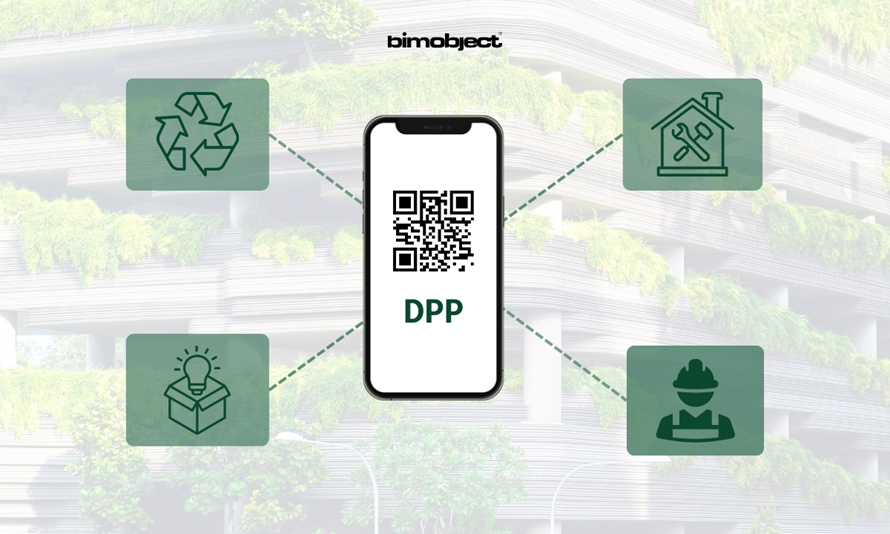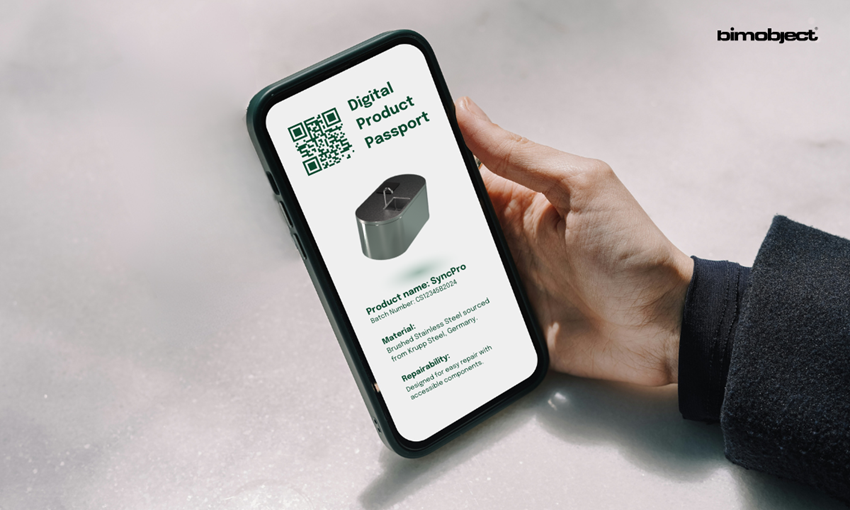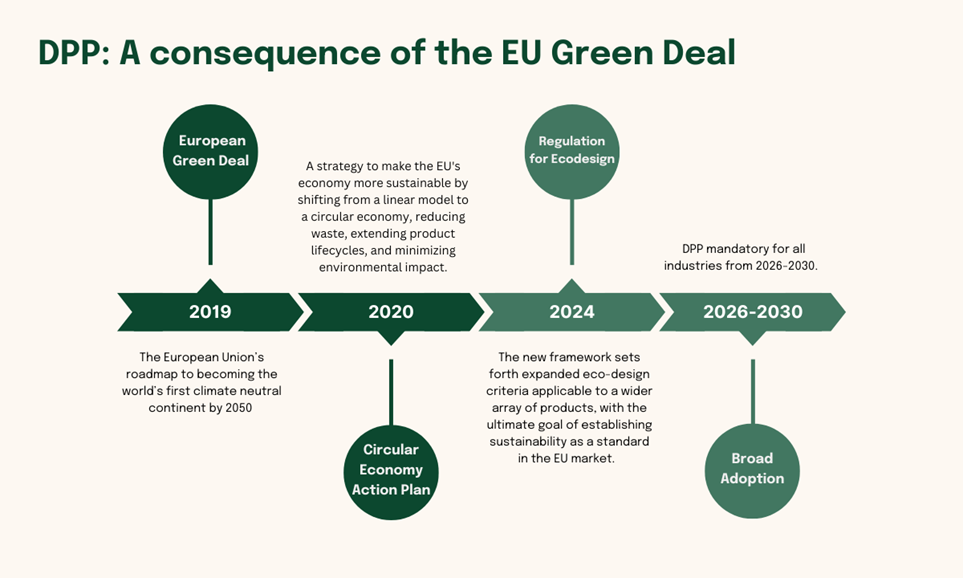
Digital Product Passport - what do you need to know?
Here, you'll find a peek into the most important things you need to learn. If you'd like to jump to a specific section, just click the hyperlinks below:
Why is the Digital Product Passport emerging? Data challenge in construction.
The relentless expansion of our population and the ceaseless drive for progress has paved the way for both remarkable advancements and significant environmental challenges. As cities grow and the built environment improves, the repercussions of these developments manifest starkly in global warming, resource depletion, ecological damage, and the thinning of the ozone layer.
The International Energy Agency (IEA) highlights the environmental impact in a telling illustration. According to their 2022 report, the built environment is a major cause of carbon dioxide (CO2) emissions, responsible for 16 gigatons or equivalently 40% of the annual global CO2 emissions. This is in stark contrast to aviation, often criticized for its environmental impact, which contributes a comparatively minor 2.5% to global carbon emissions.
In response to these alarming figures, European legislation is rapidly evolving, driving the construction industry towards greater digitalization and sustainability. Compliance with these new regulations is no longer optional but a vital component of industry survival. The construction sector faces substantial hurdles, particularly in data management and transparency. The current landscape is hindered by fragmented information about products and materials, resulting in inefficiencies and complications when tracking the lifecycle of construction materials.
DPPs have emerged as a promising solution to combat these issues. These passports offer a standardized, digital framework for product information aimed at streamlining data management and enhancing transparency throughout the supply chain.
Find out why sustainability is no longer an option but a necessity in today's market in this webinar.
What is a Digital Product Passport, and what is its purpose?
In the same way that a travel passport documents your journey, the DPP tracks a product’s entire lifecycle, from material sourcing and extraction to end-of-life recycling. It will be permanently attached to each product as an NFC chip, QR code, or RFID tag.
Data collection will begin at the product’s design phase by documenting all the material it contains, where it is sourced, and where the product was assembled. DPP will be continually updated to reflect information such as the sale date, any repairs made, and any parts replaced.
The DPP's primary goals are to foster sustainable production, drive digital transformation, uncover new business opportunities, empower consumers to make sustainable choices and help authorities ensure legal compliance.

What data is stored in a digital product passport?
The EU is still determining the exact data requirements, including standardizing definitions and data collection methods. However, here are some examples of what the DPP will likely include:
General product data: This would include basic information such as product name, batch number, manufacturing date, and warranty details.
Material data: Showing the origins of raw materials and components, as well as the suppliers involved in sourcing.
Ownership data: Information about current and past owners (very relevant for products with a long lifetime that can be sold and resold multiple times).
Repair data: Intell about the overall repairability of the product and specific repair events and reasons.
Sustainability data: This would include the carbon footprint of the manufacturing, supplying processes and the user phase (Psst, Prodikt could help you with this).
Looking to improve your sustainability efforts? Learn how Life Cycle Assessments (LCAs) and Environmental product declarations (EPDs) are essential for meeting sustainability standards.
Who does a Digital Product Passport affect?
DPPs are set to significantly impact all brands and manufacturers. Companies must now fully grasp the design, production, use, and recycling of their products, managing a substantial amount of information.
Building product manufacturers who cannot provide their clients with sufficient data (now demanded as a DPP) will eventually be replaced by those who can.
Many brands and manufacturers must reconsider their business practices in the early stages of DPP implementation. However, adopting DPPs will supply companies with essential data on their environmental impact, accelerate sustainability goals, and allow them to command higher prices for more responsibly produced products.
The European Union seeks to tackle urgent issues like cutting carbon emissions, reducing waste, and encouraging circular economy practices. DPPs could play a key role in addressing these challenges by improving transparency, accountability, and traceability in supply chains.
The global reach of the Digital Product Passport
Although the DPP is an EU regulation, its impact will extend well beyond Europe. For example, a window manufacturer headquartered outside the EU that produces its products in Asia and then sells them in Europe will still need to comply with all the relevant DPP regulations. It applies to any product bought or sold in the European market. DPPs will eventually become a global standard no matter where the product is made or where the manufacturer is located.

How will the Digital Product Passport affect the construction industry?
New regulations drive demand for data in construction. The European Parliament estimates that 80% of a product's environmental impact is decided at the design stage. So, how can DPPs make this phase as 'green' as possible?
Precise and detailed data will provide architects and engineers with even more insight into the technical specifications of components and their carbon footprint. A powerful amount of key data will drive decisions during the design phase, which will benefit not only the planet but also businesses. After all, energy efficiency or the prevention of material waste contributes significantly to reducing costs and increasing the efficiency of operations.
What is the timeline for the Digital Product Passport, when to prepare
DPPs will cover a wide range of at least 30 product categories. Starting as early as 2026, DPPs are anticipated to be implemented in the first business sectors, beginning with batteries, electronics, and textiles, followed by the construction industry. Industry stakeholders are already taking proactive steps to ensure compliance.

The importance of data for Digital Product Passport
The heightened demand for data presents its own set of challenges. For building owners, the burden of meeting these requirements is both daunting and costly. Legal mandates and market pressures push for more rigorous documentation and data collection, inevitably driving up project expenses.
This push for transparency is not isolated to Europe. It mirrors global initiatives such as California’s Proposition 65, which mandates that manufacturers disclose the presence of harmful chemicals in their products sold in the United States. These regulations are part of a broader trend toward increased accountability and sustainability in the built environment.
Given that only 9% of the world’s economy is currently circular and that 75% of extracted resources are non-renewable, the Digital Product Passport represents a critical step towards transforming how we manage product life cycles and environmental impact. While the Digital Product Passport represents a significant shift in how we approach product information and sustainability, it is clear that these changes are here to stay. Embracing DPP not only aligns with evolving regulations but also positions companies at the forefront of a global movement toward a more transparent and sustainable future.
Stay up-to-date with the latest developments on the Digital Product Passport and other industry trends. Subscribe to our newsletter for updates and insights delivered straight to your inbox!








